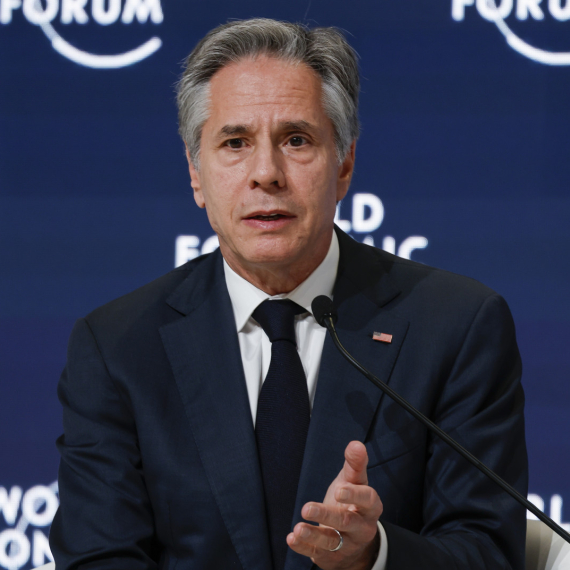Oil prices down after reaching close to USD 120
Record-breaking oil prices fell on Wednesday after spiking near 120 dollars per barrel, AFP says.
Wednesday, 23.04.2008.
19:32

Record-breaking oil prices fell on Wednesday after spiking near 120 dollars per barrel, AFP says. This comes as international concern mounted over soaring energy costs and the world's top producer appealed for calm. Oil prices down after reaching close to USD 120 Traders were also on tenterhooks ahead of the weekly US energy inventories report, which has the potential to push prices beyond the psychological barrier of 120 dollars. New York's main oil futures contract, light sweet crude for delivery in June, shed 33 cents to 117.74 dollars a barrel. The May contract had struck a record high 119.90 before expiring Tuesday. London's Brent North Sea crude for June delivery lost 42 cents to 115.53 dollars on Wednesday, after hitting a lifetime peak of 116.75 on Tuesday. Prices soared to historic heights on Tuesday as an attack on crude pipelines in Nigeria further tightened global energy supplies, which are under intense pressure with crude cartel OPEC refusing to raise short-term output. Additional support came from the weak U.S. currency, which makes dollar-priced oil cheaper for foreign buyers and stimulates demand. The euro surged past 1.60 dollars for the first time on Tuesday. "Oil has eased back to below 118 dollars a barrel amid profit taking after crude prices have gained just over 18 percent this month," said analyst Nimit Khamar at the Sucden brokerage in London. "However, markets remain sensitive to the situation in Nigeria and on fears that a strike at a refinery in Scotland could hurt supply." Talks resumed on Tuesday in London to avert a planned strike at one of Britain's key oil refineries which threatens to disrupt fuel supplies across Scotland and northern England. Officials from the Unite trade union sat down with managers from Ineos, which owns the Grangemouth refinery between Glasgow and Edinburgh, for discussions over the industrial action planned for Sunday and Monday. "Market sentiment is bullish in the immediate term," added Victor Shum, senior principal of Purvin and Gertz energy consultancy in Singapore. "The weak U.S. dollar, real supply disruption in Nigeria... are pushing prices higher." Later on Wednesday, the U.S. Energy Information Administration releases its weekly report on American energy stockpiles for the week ending April 18. The release is a focal point because the United States is the biggest energy consumer in the world, followed by number two China. In Rome on Tuesday, ministers from 74 countries at the International Energy Forum said prices should be at acceptable levels for producers and consumers to ensure global economic growth, particularly in developing countries. U.S. President George W. Bush also expressed concern at the impact of high price levels on consumers. Saudi Arabia's petroleum minister, Ali al-Naimi, called Tuesday for calm in the face of runaway oil prices, and added that the world was not running out of crude. The root of the problem was primarily due to "limited capacity along the entire supply chain.... at its heart, this is not an energy resource issue; it is primarily an investment issue," he said at the Rome forum. Saudi Arabia is the biggest producer in the Organization of the Petroleum Exporting Countries (OPEC), which on Tuesday said that it plans to increase its production capacity by five million barrels per day (bpd) by 2012. Current OPEC output stands at about 32 million bpd. Global supply worries were stoked after Anglo-Dutch oil group Royal Dutch Shell reported an output loss of 169,000 bpd from sabotage of its key pipelines in southern Nigeria.
Oil prices down after reaching close to USD 120
Traders were also on tenterhooks ahead of the weekly US energy inventories report, which has the potential to push prices beyond the psychological barrier of 120 dollars.New York's main oil futures contract, light sweet crude for delivery in June, shed 33 cents to 117.74 dollars a barrel. The May contract had struck a record high 119.90 before expiring Tuesday.
London's Brent North Sea crude for June delivery lost 42 cents to 115.53 dollars on Wednesday, after hitting a lifetime peak of 116.75 on Tuesday.
Prices soared to historic heights on Tuesday as an attack on crude pipelines in Nigeria further tightened global energy supplies, which are under intense pressure with crude cartel OPEC refusing to raise short-term output.
Additional support came from the weak U.S. currency, which makes dollar-priced oil cheaper for foreign buyers and stimulates demand. The euro surged past 1.60 dollars for the first time on Tuesday.
"Oil has eased back to below 118 dollars a barrel amid profit taking after crude prices have gained just over 18 percent this month," said analyst Nimit Khamar at the Sucden brokerage in London.
"However, markets remain sensitive to the situation in Nigeria and on fears that a strike at a refinery in Scotland could hurt supply."
Talks resumed on Tuesday in London to avert a planned strike at one of Britain's key oil refineries which threatens to disrupt fuel supplies across Scotland and northern England.
Officials from the Unite trade union sat down with managers from Ineos, which owns the Grangemouth refinery between Glasgow and Edinburgh, for discussions over the industrial action planned for Sunday and Monday.
"Market sentiment is bullish in the immediate term," added Victor Shum, senior principal of Purvin and Gertz energy consultancy in Singapore.
"The weak U.S. dollar, real supply disruption in Nigeria... are pushing prices higher."
Later on Wednesday, the U.S. Energy Information Administration releases its weekly report on American energy stockpiles for the week ending April 18.
The release is a focal point because the United States is the biggest energy consumer in the world, followed by number two China.
In Rome on Tuesday, ministers from 74 countries at the International Energy Forum said prices should be at acceptable levels for producers and consumers to ensure global economic growth, particularly in developing countries.
U.S. President George W. Bush also expressed concern at the impact of high price levels on consumers.
Saudi Arabia's petroleum minister, Ali al-Naimi, called Tuesday for calm in the face of runaway oil prices, and added that the world was not running out of crude.
The root of the problem was primarily due to "limited capacity along the entire supply chain.... at its heart, this is not an energy resource issue; it is primarily an investment issue," he said at the Rome forum.
Saudi Arabia is the biggest producer in the Organization of the Petroleum Exporting Countries (OPEC), which on Tuesday said that it plans to increase its production capacity by five million barrels per day (bpd) by 2012. Current OPEC output stands at about 32 million bpd.
Global supply worries were stoked after Anglo-Dutch oil group Royal Dutch Shell reported an output loss of 169,000 bpd from sabotage of its key pipelines in southern Nigeria.

























































Komentari 0